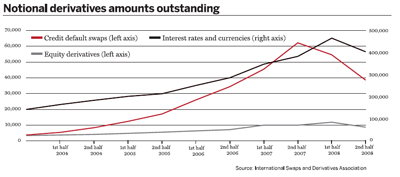The fall-out from the Lehman Brothers collapse exposed the true extent of risk in the over-the-counter derivatives market and highlighted the need for change. While there is still no clear path for the market's future, it is not too difficult to anticipate what the Obama administration has in store for the sector. Writer Janet Lewis
When Lehman Brothers collapsed in September 2008, one of the biggest worries for the market and regulators was the sheer size of its over-the-counter (OTC) derivatives exposure. As one of the market's largest players, the question was how much Lehman actually owed, and to whom - and what would happen to the financial system if it defaulted. Estimates varied wildly for the value of the firm's outstanding deals, with some putting it into the trillions.
Fortunately, in one market segment the Depository Trust & Clearing Corporation (DTCC), which centrally clears, settles and registers global securities and derivatives transactions, had prepared in advance for just such a crisis. In late 2006 it launched a service for matching, confirming and collecting information on OTC credit derivatives deals. By mid-2007, DTCC had entered records on more than 2.2 million outstanding credit derivatives contracts into its Trade Information Warehouse, and was able to help regulators and administrators safely unwind Lehman's credit derivatives trades within a few weeks. However, uncertainty continued over Lehman's other OTC derivatives exposures, contributing to the paralysis of the credit markets.
In the new US regulatory structure for derivatives emerging in the wake of the financial meltdown, the DTCC is likely to be a lynchpin. Although Congress has not yet passed any legislation, proposals by the Barack Obama administration press for standardisation of derivatives contracts to facilitate clearing by regulated, well-capitalised central counterparties - including DTCC - and reporting of all trades, whether centrally cleared or not, to a trade information repository such as the DTCC's.
"We work with central clearing organisations to capture contract details, currently about 41,000 sides per day in the warehouse," says Larry Thompson, managing director and general counsel at DTCC. Until July 2009, the 'warehouse' only handled standardised contracts, but now can capture details on customised contracts as well, Mr Thompson says. The facility was also built to extend to other types of derivatives contracts besides credit derivatives.
Can we exchange it?
The Obama administration's proposals, while part of an overall framework aiming to strengthen oversight and harmonise regulation of securities and derivatives, are considerably less radical than those that Senate Agriculture Committee chairman Tom Harkin calls for in his own proposed legislation. Mr Harkin would like to force trading of all financial derivatives on to public exchanges regulated by the Commodity Futures Trading Commission, which his committee oversees. However, Mr Harkin is unlikely to prevail in this debate, since he has few supporters for this extreme stance - even the major US futures and commodity exchanges came out against the idea in testimony before Congressional committees.
The regulated exchanges get much of their business from OTC derivatives dealers, which use the exchanges to lay off their own risks. Some, such as the Chicago Mercantile Exchange, also have OTC clearing businesses. Terry Duffy, executive chairman of the CME, testified in June before the Capital Markets subcommittee of the House Finance Committee that while the exchange supports position reporting and increased price transparency for OTC derivatives, it is not anxious to see all derivatives trades on exchanges - or even mandated central clearing of all transactions. He said that this "could well induce certain market participants to transfer this business offshore, resulting in a loss to the US economy".
"We are concerned that this may result in a significant shift of related transactions that would have been traded on US-regulated exchanges to foreign jurisdictions. By reducing liquidity on markets regulated by US regulators, this shift could undermine the established price discovery and risk hedging missions of US futures exchanges," he testified. Instead, Mr Duffy suggested, regulators can reduce systemic risk through increased position reporting, lowering of capital charges for cleared OTC positions and raising of capital charges for uncleared positions.
Advocates of standardisation
Robert Pickel, chief executive of the International Swaps and Derivatives Association, says he believes that the market will increasingly move toward more standardisation and central clearing of over-the-counter derivatives with or without new regulation. "Standardisation is the inevitable evolution of a successful product and there is already plenty of incentive to clear more trades centrally - such as reducing counterparty risk and operational risk," he says. "Even under the current regulatory capital treatment, there is a capital benefit to central clearing."
Of course, standardisation and central clearing would also considerably reduce the margins Wall Street firms make from their derivatives businesses, which is one reason they are continuing to fight hard against the idea. In both House and Senate hearings, JPMorgan Chase executives contended that customisation of derivatives is often necessary for clients who want their hedges to match their risks exactly, and who do not want to have to devote their liquid assets to posting collateral for a clearing house. "Clients such as Chesapeake, Constellation, Medtronic and Cargill are very worried about the unintended consequences of these policy proposals, particularly at a time when our economy remains fragile," says Don Thompson, associate general counsel at JPMorgan Chase in testimony before the House subcommittee. "In our view, the effect of forcing such companies to face an exchange or a clearing house would limit their ability to manage the risks they incur in operating their business and have negative financial consequences for them via increased collateral and margin posting."
Nonetheless, Mr Harkin is not alone in his belief that continuing to allow an extensive business in customised derivatives to exist would create a "giant loophole" for systemic risk, a return to the same kind of opaque and highly leveraged markets that contributed to the financial meltdown.
A critical rethink
Another such sceptic is Richard Bookstaber, a former academic, Wall Street and hedge fund executive who helped pioneer the development of OTC derivatives in the 1980s.
Mr Bookstaber, who in 2007 published a prophetic book on the subject, A Demon of Our Own Design: Markets, Hedge Funds, and the Perils of Financial Innovation, is like one of the nuclear scientists on the Manhattan Project, looking on in horror at the destruction he helped to unleash. While in their early days, he says, OTC derivatives were a good solution for reducing risk in the market, they have increasingly been applied to skirting regulation. "Derivatives have become a way to lever when you are not supposed to lever, to take exposure in securities you are not supposed to take, to short instruments you are not supposed to short, and to avoid taxes," he says. "Just because you can create an asset out of some cash flow doesn't mean you should."
While Mr Bookstaber says that Mr Harkin's plan to entirely ban OTC derivatives would be "unwise", he says the question both regulators and clients should be asking is whether "a complex customised instrument is really needed or can something simple and standard do the job". He contends that hedging can never be that exact, since the target prices or maturities are really just estimates anyway. So in the vast majority of cases, a standardised product - or a combination of standardised products - can get close enough, while offering better pricing and transparency and less counterparty risk.
Mr Bookstaber calls JPMorgan's argument regarding the difficulty of posting liquid collateral on an exchange or clearing house "a non-starter". Of course, companies would prefer to put up something illiquid such as land or intellectual property as collateral, he says, but that defeats the purpose. "The ability to use illiquid assets to back highly liquid instruments is not a virtue - it makes no sense," he says. The practice just makes a market liquidity crisis more likely, since the assets can't be sold quickly to meet a cash call.
Robert Pickel, chief executive of the International Swaps and Derivatives Association
No catch-all solution
However, John Jay, a senior analyst at financial consultancy Aite Group, is a sceptic about the Obama administration's approach. Mr Jay, a specialist in OTC derivatives, sees several problems with the centralised clearing and reporting model. "Central clearing doesn't necessarily alleviate systemic risk - in fact it might concentrate risk," he says. "The clearing house, while facing all transactions, still has limited, not infinite capital, and ultimately relies on the capital of the member firms," which might not be adequate in a crisis.
Meanwhile, Mr Jay adds, reporting of positions in uncleared, customised derivatives to a warehouse is unlikely to be timely enough to keep up with rapidly moving markets. "It might be possible to do it weekly, and for any of these things the pricing is only a best guess." What really concerns him, however, is whether regulators looking at these reports will be in a position to truly understand them and hold players accountable. To do that, the US government will have to be able to hire and pay people with the necessary knowledge and experience. "You can't just throw down rules and principles and then not be able to cope with it," says Mr Jay.
However, the Obama administration's model of increased standardisation, centralised clearing and reporting seems to be where US derivatives regulation is heading as market opinion coalesces around this fairly moderate position. Highly dramatic change - such as a merging of financial regulators or a total ban on customised derivatives - looks increasingly unlikely, even with a Democratic majority in both houses of Congress. Wall Street's lobbying power may not be what it once was, but it is by no means a spent force.




